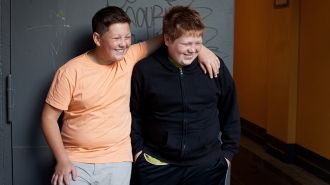- Our studies
- Our research
- Publications and resources
- Data access and training
- About
- News
- Events
- Get in touch
- Join our mailing list
Welcome to our news and blogs section. Here you’ll find the latest developments and insights from across our longitudinal studies.
Growing Up in the 2020s is the country’s first comprehensive long-term study tracking adolescents’ development and educational outcomes following the Covid-19 pandemic.

Young people today are more likely to be depressed and to self-harm than they were 10 years ago, but antisocial behaviour and substance use – often thought to go hand-in-hand with mental ill-health – are on the decline.

Professor Emla Fitzsimons appeared on BBC Radio 4’s Analysis programme last night (4 February) to highlight Millennium Cohort Study research looking at the impact of family structure on children’s prospects.

Obese and overweight children are no more likely than their peers to be admitted to hospital for health problems and injuries during childhood and early adolescence.

Children who experience a family break-up in late childhood and early adolescence are more likely to have emotional and behavioural problems than those living with both parents, according to a new study.

Adolescents using social media for three hours or more a day are more likely to show signs of depression at age 14, compared to their peers who use it less often.

Equal access to quality education is not only important for children’s individual life chances, it’s vital for their future participation in society, Professor Alissa Goodman told delegates at a UNICEF event in Florence, Italy in October.
The BBC One Show travelled back to 1969 last night (21 November) to feature a film about three National Child Development Study (NCDS) members who wrote essays at age 11 imagining what their lives would be like when they reached 25.

Overweight and obese children who are physically inactive are more likely to have poor wellbeing than their more active peers who are a similar weight, according to a new study.

Higher education has been less lucrative for women of Generation X than it was for the Baby Boomers, new research reveals.
Girls who are avid gamers are three times more likely to study physical science, technology, engineering and maths (PSTEM) degrees at university, compared to non-gamers.

Choosing the right field of study is more important than attending an elite university for those aiming to become top earners by middle age, according to new findings from the UCL Institute of Education.
Pupils taking the ‘EBacc’ curriculum are only slightly more likely than their peers to go to university, according to a new study.
Ryan Bradshaw
Senior Communications Officer
Phone: 020 7612 6516
Email: r.bradshaw@ucl.ac.uk